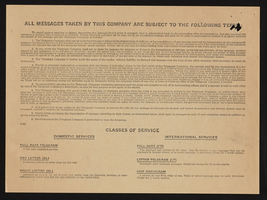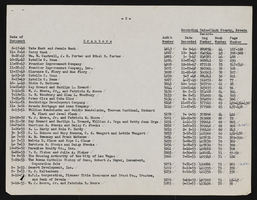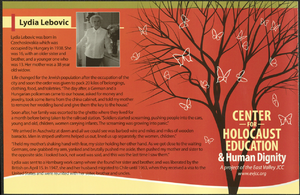Search the Special Collections and Archives Portal
Search Results
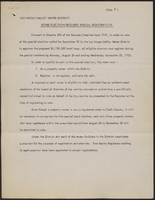
Notice of special registration for bond election, Clark County, Nevada, 1953
Date
Archival Collection
Description
Notice of the requirement of special registration by property and corporation land owners in Clark County to vote in the 1953 bond issue for the Water District. A list of registrars and registration places included on second page. The bond issue announcement and an itemized list of proposed expenditures to be paid from the bonds are referenced below.
Text
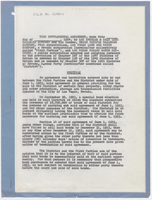
Supplemental agreement (blanks not filled) between Los Angeles & Salt Lake Railroad and partner companies and the Las Vegas Water District, C. L. D. No. 11362-1, 1954
Date
Archival Collection
Description
The purchase contract for the Las Vegas Land and Water Company allows for the contract to be annulled if its bonds are not sold by December 31, 1953. This contract rescinds that deadline, allowing as much time as needed for the sale of the bonds. Agreement that all parties will ignore the provision that any party can terminate the agreement if the bonds do not sell by May 1, 1954.
Text
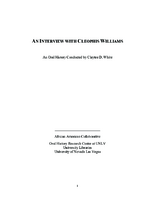
Transcript of interview with Cleophis Williams by Claytee White, April 27, 2010
Date
Archival Collection
Description
In 1943, Cleophis Hill Williams was a teenager visiting her mother who had moved to Las Vegas. For most of her young life she had lived with her parents in Muskogee, Oklahoma and Paul Spur/Douglas, Arizona. The same year that she visited Las Vegas, she met her future husband Tom Williams, with whom she had nine children, all born and raised on the Westside. Tom worked construction and built their first home on G Street. For Cleophis, she focused her life on raising her children and, whenever possible, finding some precious time to read.
Text
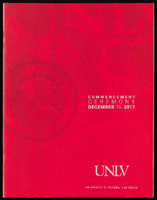
University of Nevada, Las Vegas (UNLV) Fall 2017 commencement program
Date
Archival Collection
Description
Commencement program from University of Nevada, Las Vegas Commencement Programs and Graduation Lists (UA-00115).
Text

Jill Roberts oral history interview: transcript
Date
Archival Collection
Description
Oral history interview with Jill Roberts conducted by Barbara Tabach and Claytee D. White on March 20, 2018 for the Remembering 1 October Oral History Project. In this interview, Jill Roberts discusses her position as the CEO of the Trauma Intervention Program (TIP) of Southern Nevada. She also delves into her part-time work at the coroner's office as a death investigator and discusses her personal background in Las Vegas, Nevada after she moved to the city in 1977. She describes the role TIP had during the aftermath of the October 1, 2017 mass shooting, where well-trained volunteers were dispatched to hotels, hospitals, and anywhere else the survivors reached in order to provide emotional and practical support. Throughout the interview, Roberts emphasizes that the assistance provided to those in a traumatic event depends on each individual's needs. She shares a few examples of what the TIP volunteers had helped with after the shooting, including listening to the survivors' stories as well as providing information on the situation, helping separated loved ones find each other, arranging travel for some survivors to go back to their homes, and procuring clothes and shoes for those who needed them. Roberts also discusses the gratitude TIP had received after the shooting, including the thank you cards sent by Sandy Hook High School.
Text
Alterwitz-Stralser, Deanne
Deanne Alterwitz-Stralser (née Friedman) was born January 1, 1931 in Hammond, Indiana, the daughter of an insurance salesman and a stay-at-home mom. Alterwitz-Stralser spent her childhood in Calumet City, just across the state line in Illinois, and was raised with a strong Jewish identity. At the age of sixteen, she met her husband, Oscar Alterwitz, at an Alpha Zadik Alpha (AZA) dance in Gary, Indiana, and the two were married in 1950.
Person

